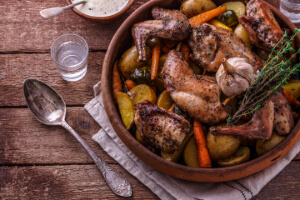
When you are looking for a way to change up your meals, look no further than the rabbit. Rabbit meat is a popular staple in countries around the world, even if it has not fully caught on in America. This is a delicious meat, and there are many health benefits with rabbit as part of your diet. Whether you are preparing main dishes or appetizing sides, add rabbit meat to your rotation and take advantage of all the benefits it has to offer.
Rabbit Nutrition
According to the USDA, every 3 ounces of rabbit meat has the following nutritional value:
Amount Daily Value %
- Calories: 147
- Total Fat: 3 g 4%
- Saturated Fat: 0.9 g 4%
- Polyunsaturated Fat: 0.6 g
- Monosaturated Fat: 0.8 g
- Cholesterol: 105 mg 35%
- Sodium: 38 g 1%
- Potassium: 292 mg 8%
- Total Carbohydrate: 0 g 0%
- Dietary Fiber: 0 g 0%
- Sugar: 0 g 0%
- Protein: 28 g 56%
- Vitamin A 0%
- Calcium 1%
- Vitamin D 0%
- Cobalamin 91%
- Vitamin C 0%
- Iron 22%
- Vitamin B6 15%
- Magnesium 6%
These percentage values are all based on a 2,000 calorie diet.
Because of rabbit meat’s classification as game meat, you may not know much about its health benefits. To fully understand the benefits of rabbit, it is helpful to compare its nutritional value to other meats, like chicken or beef. Rabbit has the highest percentage of digestible proteins compared to other meats while also having the lowest amount of fat. Despite the low amount of fat, rabbit is still rich in healthy fats like polyunsaturated fats and monounsaturated fats. Domesticated rabbit meat also has fewer calories than chicken and has less cholesterol than any other commonly consumed meats, like beef, pork, and chicken.
For those looking for high vitamin content, rabbit is an excellent choice. Rabbit meat is rich in vitamins B12 and E, while also having a higher concentration of most minerals. One mineral it is lower in compared to other meats is sodium, making rabbit even more appealing to people with high blood pressure. You can find higher levels of phosphorous and calcium in rabbit than in chicken. These two minerals work together to help build healthy bones. Rabbit is also high in niacin, which helps convert carbs to energy. As the popularity of rabbit meat grows, the dietary fortification of rabbits increases, making the nutritional properties of rabbit even better. Dietary fortification refers to improving the nutritional aspects of the meat by improving the rabbit’s diet while it is being raised. This can be accomplished by giving rabbits the right type of feed; food high in polyunsaturated fatty acids, providing higher levels of vitamin E and increasing the amount of selenium found within their food.
Selenium can be an important addition to our own diets. Selenium is a mineral our bodies use to make antioxidants that can help guard against stomach, lung, prostate, and skin cancers. It is also helpful for guarding against the hardening of your arteries. While red meats have been shown to increase the risk of cancers like colon, rectum, and gastric cancer, white meat does not seem to carry the same risks. Since rabbit is white meat, you do not have to worry as much about these forms of cancer.
As with all types of meats, the amount of nutrition you will get out of rabbit meat depends on how you prepare it. Rabbit meat can be fried without the addition of oils thanks to the composition of its meat, meaning you will not see a huge reduction in the health benefits of your rabbit meat. Other popular methods are baking, grilling, or cooking in stews. Be sure to browse our selection of rabbit recipes to see delicious ways to cook an often overlooked meat.

